中国翻译史(英文版详细)
中国翻译简史

林语堂
• 中国现代著名作家,学者、翻译家、语言 学家、新道家代表人物,1895年生于福建 漳州平和县坂仔镇一个基督教牧师家庭, 原名和乐,后改名玉堂,又改名为语堂, 早年留学美国、德国,获哈佛大学文学硕 士,莱比锡大学语言学博士。回国后分别 在清华大学、北京大学、厦门大学任教。 林语堂于1940年和1950年先后两度获得诺 贝尔文学奖提名。
中国译历史简介
A general introduction to the history of translation in China
•
中国的翻译史有史籍记载的已长达三千余 年,早在史前三皇五帝时代就存在翻译活 动,一般认为“五四"以前,中国翻译史上 出现过三次翻译高潮。
三次翻译高峰(three translation peaks)
• 1)东汉--唐宋时期 • 2)隋唐--明末清初 • 3)鸦片战争--五四运动
第一次翻译高峰期
• 佛经翻译(sutra translation)
• 释道安首创译场制度,提出著名"五失本,三不易"理论, 他主张严格的直译 • 天竺人鸠摩罗什创立了一整套译场制度,开集体翻译, 倾向于意译,注重文质结合,既忠实与原文的神情,能 “以实出华”,他反对译经时用“格义”。 • 玄奘(唐朝佛经翻译达到顶峰),他不但把佛经翻译成汉 文,而且把老子著作的一部分译成了梵文,成为了第一个 把汉文著作向国外介绍的中国人,制定了“五不翻”的原 则,即:秘密故、含多义故、无此故、顺古故以及生善故。 译文中运用的种种技巧:补充法、省略法、变位法、分合 法、译名假借法、代词还原法。
第二次翻译高峰期
• 科技翻译(science and technology translation) • 代表人物:中国科学家徐光启和意大利人 利玛窦,合作翻译《几何原本》前六卷。 • 这一阶段主要是外国人口译,中国人笔述, 国人选择译品的余地不大,译者对翻译理 论技巧知之不多,所以译作大都有“文义 难精”之弊。
中国古诗词英译..
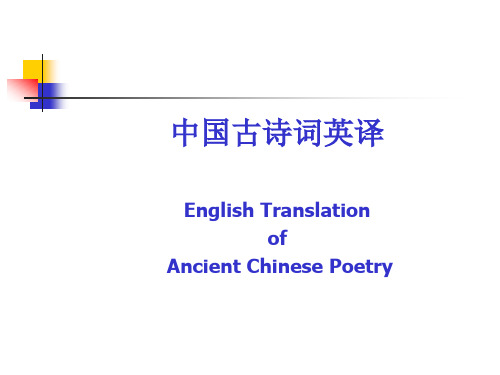
华裔学者叶维廉翻译了Chinese Poetry: Major Modes and Genres(汉诗 英华,1970),被英美许多大学作为教 材多次重印。
J.D.Frodsham等人编译了Anthology of Chinese Verse(中国诗选集,1967), John A. Turner翻译了A Golden Treasury of Chinese Poetry(英译汉诗金 库,1976),包含了自周至清代120多首 古诗译文。
同期,美国翻译家William McNaughton全面翻译了《诗经》(The Classic Anthology Defined by Confucius, 1971),瑞典汉学家B.Karlgren也英译 《诗经》(The Book of Odes, 1950)。 由Robert Kotewall和Norman L. Smith合 译的The Penguin Book of Chinese Verse (企鹅丛书· 中国诗歌卷),在中诗英译 经典化方面开了先河。
1867年,法国贡古尔学院女院士 Judith.Gautier翻译的中国古诗《玉书》 (Le Livre de Jade)被译成多种语言, 在西方世界引起很大反响。 20世纪德国伟大的作曲家Gustav Mahler把《玉书》德文译本的李白、王 维和孟浩然等作为歌词,写成了享誉世 界的合唱交响乐Das Lied von der Eerde (大地之歌)。
诗歌是讲意境的,意境包含两层含义: 一是诗歌的内容是有意蕴的,有着相当的文化内涵,诗歌的 意境和意味便来源于意蕴。艾略特所说的诗歌的可理解性、超民 族性指的就是这个。 诗歌的意蕴决定着诗歌的意义符号系统(sign system),诗歌 的可译性基本取决于此。诗歌的意蕴要素有情感、意象、情景、 人物、事件等是可译的。 当然,在一种语言符号系统中所包含的某些意蕴并不一定能 在别的语言符号系统中找到对等的意蕴,尤其是一个民族所独有 的文化意蕴。比如,中国文化中“君子”好逑、潇湘之“兰”这 两个意象的文化意蕴在西方的任何一个语种中很难找到对应物。 然而,这种意蕴一经阐释,总可以让其他民族的人能了解、理解, 进而达到共鸣。这种诗歌意蕴的可阐释性就是诗歌的可译性。
中国翻译史简介

第二大高潮:明末清初的科技翻译
以传教为主,同时介绍西方学术,客观 上促进了科学文化的交流。
从延续时间以及译著数量上都比不上先 前的佛经翻译。最重要就是翻译了天文、 数学、机械等自然科学著作,使得中国 人首次学到了西方的科学技术知识,开 阔了眼界。
清朝的林纾(字琴南)第一个把西方的文学作 品介绍给中国读者,被称为文学翻译的始祖。 文学译品甚多,字数达1200万,有《巴黎茶 花 女 遗 事 》 《 块 肉 余 生 述 》(David Copperfield), 王 子 复 仇 记 》(Hamlet), 《 撒 克 逊 劫 后 英 雄 略 》(Ivanho) 、 《 黑 奴 吁天录》(Uncle Tom's Cabin)等。
In his view,people could love each other ,except those with deep prejudices and those who could not bring themselves out in the open.
他对这些人却有些憎恶,不肯假借一点颜色。 He hated these people,and to them he couldn‘t show
第一大高潮:东汉至唐宋的佛经翻译及 代表人物
安世高 译了《大安般守意经》等35部经书,开后世禅学之源。 三支 支谶支亮、支谦
前秦时代,赵政 释道安主张严格的直译。 鸠摩罗什倾向于意译,既忠实表达原文神情,又苗趣盎然。
隋唐时期,是佛经翻译的鼎盛时期。隋朝的彦琮为佛经翻译者提 出了“八备”,在我国译论史上最早较全面地论述了翻译活动的 主题—译者本身的问题。
科技翻译的代表人物
中国翻译史及其著名翻译家
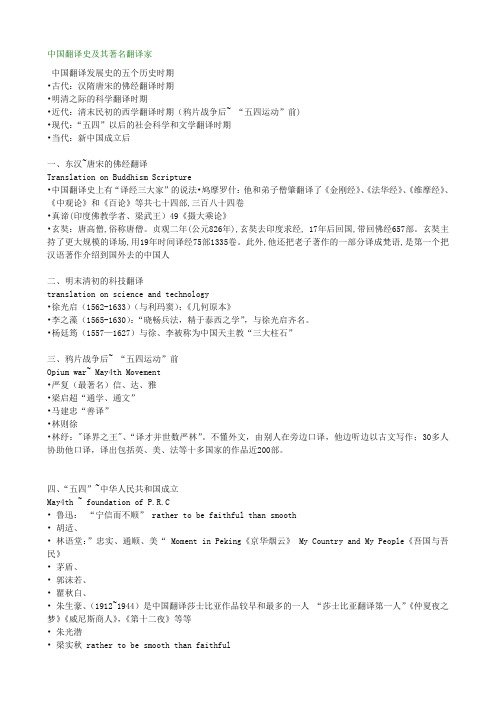
中国翻译史及其著名翻译家中国翻译发展史的五个历史时期•古代:汉隋唐宋的佛经翻译时期•明清之际的科学翻译时期•近代:清末民初的西学翻译时期(鸦片战争后~ “五四运动”前)•现代:“五四”以后的社会科学和文学翻译时期•当代:新中国成立后一、东汉~唐宋的佛经翻译Translation on Buddhism Scripture•中国翻译史上有“译经三大家”的说法•鸠摩罗什:他和弟子僧肇翻译了《金刚经》、《法华经》、《维摩经》、《中观论》和《百论》等共七十四部,三百八十四卷•真谛(印度佛教学者、梁武王)49《摄大乘论》•玄奘:唐高僧,俗称唐僧。
贞观二年(公元826年),玄奘去印度求经, 17年后回国,带回佛经657部。
玄奘主持了更大规模的译场,用19年时间译经75部1335卷。
此外,他还把老子著作的一部分译成梵语,是第一个把汉语著作介绍到国外去的中国人二、明末清初的科技翻译translation on science and technology•徐光启(1562-1633)(与利玛窦):《几何原本》•李之藻(1565-1630):“晓畅兵法,精于泰西之学”,与徐光启齐名。
•杨廷筠(1557—1627)与徐、李被称为中国天主教“三大柱石”三、鸦片战争后~ “五四运动”前Opium war~ May4th Movement•严复(最著名)信、达、雅•梁启超“通学、通文”•马建忠“善译”•林则徐•林纾:"译界之王"、“译才并世数严林”。
不懂外文,由别人在旁边口译,他边听边以古文写作;30多人协助他口译,译出包括英、美、法等十多国家的作品近200部。
四、“五四”~中华人民共和国成立May4th ~ foundation of P.R.C•鲁迅:“宁信而不顺” rather to be faithful than smooth•胡适、•林语堂:”忠实、通顺、美“ Moment in Peking《京华烟云》 My Country and My People《吾国与吾民》•茅盾、•郭沫若、•瞿秋白、•朱生豪、(1912~1944)是中国翻译莎士比亚作品较早和最多的一人“莎士比亚翻译第一人”《仲夏夜之梦》《威尼斯商人》,《第十二夜》等等•朱光潜•梁实秋 rather to be smooth than faithful五、新中国成立以后(当代)•新中国成立初期:环境特殊、“一边倒”苏联著作•“文革”时期:翻译、出版领域,基本上成为一片荒漠•改革开放以来:翻译出版事业蓬勃发展,形成中国翻译史上又一次(第四次)翻译高潮。
中国翻译简史(英语专业版)
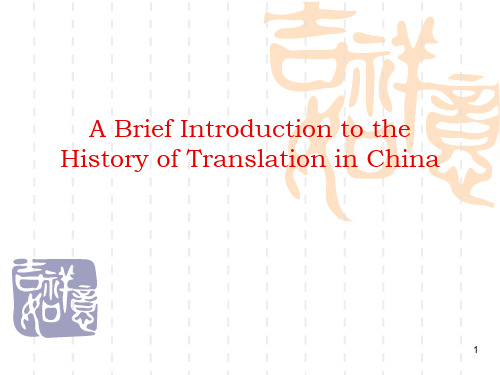
10
3. Modern introduction of western thoughts through translation (19th~mid-20th)
11
see its word file*
It may be safely assumed that, two thousand years ago, before Caesar set foot in southern Britain, the whole country visible from the windows of the room in which I write, was in what is called “the state of nature”. Except, it may be, by raising a few sepulchral mounds, such as those which still, here and there, break the following contours of the downs, man’s hands had made no mark upon it; and the thin veil of vegetation which overspread the broadbacked heights and the shelving sides of the tombs was unaffected by his industry. The native grasses and weeds, the scattered patches of gorse, contended with one another for the possession of the scanty surface soil; they fought against the droughts of summer, the frosts of winter, and the furious gales which swept, with unbroken force, now from the Atlantic, and now from the North Sea, at all times of the year; they filled up, as they might, the gaps made in their ranks by all sorts of underground animal ravagers. One year after another, with an average population, the floating balance of the unceasing struggle for existence among the indigenous plants, maintained itself.
(完整版)中国翻译史及重要翻译家
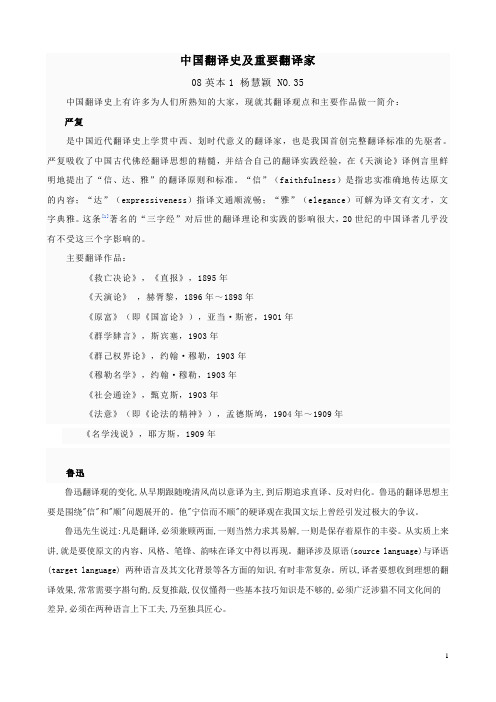
中国翻译史及重要翻译家08英本1 杨慧颖 NO.35中国翻译史上有许多为人们所熟知的大家,现就其翻译观点和主要作品做一简介:严复是中国近代翻译史上学贯中西、划时代意义的翻译家,也是我国首创完整翻译标准的先驱者。
严复吸收了中国古代佛经翻译思想的精髓,并结合自己的翻译实践经验,在《天演论》译例言里鲜明地提出了“信、达、雅”的翻译原则和标准。
“信”(faithfulness)是指忠实准确地传达原文的内容;“达”(expressiveness)指译文通顺流畅;“雅”(elegance)可解为译文有文才,文字典雅。
这条[1]著名的“三字经”对后世的翻译理论和实践的影响很大,20世纪的中国译者几乎没有不受这三个字影响的。
主要翻译作品:《救亡决论》,《直报》,1895年《天演论》,赫胥黎,1896年~1898年《原富》(即《国富论》),亚当·斯密,1901年《群学肄言》,斯宾塞,1903年《群己权界论》,约翰·穆勒,1903年《穆勒名学》,约翰·穆勒,1903年《社会通诠》,甄克斯,1903年《法意》(即《论法的精神》),孟德斯鸠,1904年~1909年《名学浅说》,耶方斯,1909年鲁迅鲁迅翻译观的变化,从早期跟随晚清风尚以意译为主,到后期追求直译、反对归化。
鲁迅的翻译思想主要是围绕"信"和"顺"问题展开的。
他"宁信而不顺"的硬译观在我国文坛上曾经引发过极大的争议。
鲁迅先生说过:凡是翻译,必须兼顾两面,一则当然力求其易解,一则是保存着原作的丰姿。
从实质上来讲,就是要使原文的内容、风格、笔锋、韵味在译文中得以再现。
翻译涉及原语(source language)与译语(target language) 两种语言及其文化背景等各方面的知识,有时非常复杂。
所以,译者要想收到理想的翻译效果,常常需要字斟句酌,反复推敲,仅仅懂得一些基本技巧知识是不够的,必须广泛涉猎不同文化间的差异,必须在两种语言上下工夫,乃至独具匠心。
英文版中国成语故事_成语典故素材
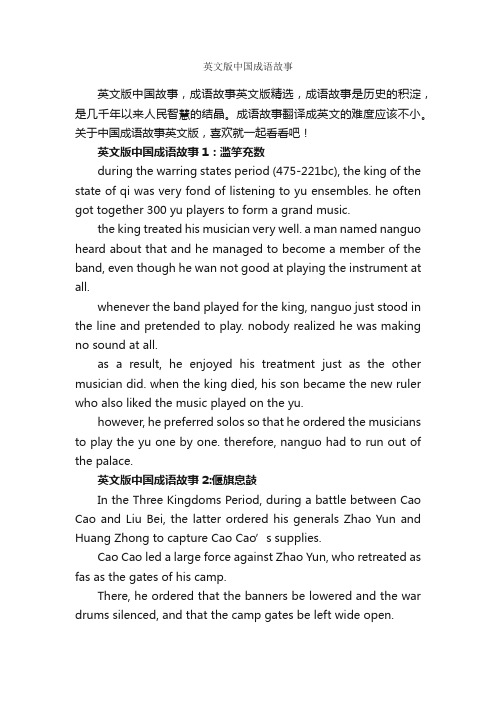
英文版中国成语故事英文版中国故事,成语故事英文版精选,成语故事是历史的积淀,是几千年以来人民智慧的结晶。
成语故事翻译成英文的难度应该不小。
关于中国成语故事英文版,喜欢就一起看看吧!英文版中国成语故事1:滥竽充数during the warring states period (475-221bc), the king of the state of qi was very fond of listening to yu ensembles. he often got together 300 yu players to form a grand music.the king treated his musician very well. a man named nanguo heard about that and he managed to become a member of the band, even though he wan not good at playing the instrument at all.whenever the band played for the king, nanguo just stood in the line and pretended to play. nobody realized he was making no sound at all.as a result, he enjoyed his treatment just as the other musician did. when the king died, his son became the new ruler who also liked the music played on the yu.however, he preferred solos so that he ordered the musicians to play the yu one by one. therefore, nanguo had to run out of the palace.英文版中国成语故事2:偃旗息鼓In the Three Kingdoms Period, during a battle between Cao Cao and Liu Bei, the latter ordered his generals Zhao Yun and Huang Zhong to capture Cao Cao’s supplies.Cao Cao led a large force against Zhao Yun, who retreated as fas as the gates of his camp.There, he ordered that the banners be lowered and the war drums silenced, and that the camp gates be left wide open.Zhao Yun then stationed(安置,驻扎) his troops in ambush(埋伏) nearly. When Cao Cao arrived and saw the situation, he immediately suspected a trap and withdrew his forces.This idiom is nowadays used to indicate metaphorically(隐喻地) halting an attack or ceasing all activities.英文版中国成语故事3:破镜重圆in the northern and southern dynasties when the state of chen (a.d. 557-589) was facing its demise(死亡,终止) , xu deyan, husband of the princess, broke a bronze mirror into halves.each of them kept a half as tokens(代币,符号) in case they were separated. soon afterwards, they did lose touch with each other, but the two halves of the mirror enabled them to be reunited.this idiom is used to refer to the reunion of a couple after they lose touch or break up.成语故事是中国所特有的,总感觉翻译成英文的就变了味儿。
第1讲 翻译入门%26中国翻译史简介
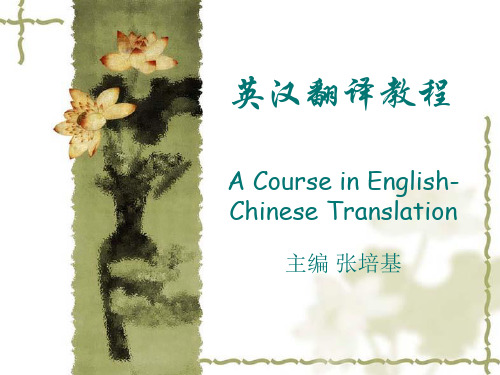
❖ I wake, and moonbeams play around my bed, Glittering like hoar-frost to my wandering eyes; Up towards the glorious moon I raise my head, Then lay me down-and thoughts of home arise.
❖ 译文一:孔子说:“学习了而时常温习,不也高兴吗!有朋 友从远方来,不也快乐吗!别人不了解我,我并不怨恨,不 也是君子吗?”(徐志刚 译)
❖ 译文二:The Master said, ‘To learn and at due times to repeat what one has learnt, is that not after all a pleasure? That friends should come to one from afar, is this not after all delightful? To remain unsoured even though one’s merits are unrecognized by others, is that not after all what is expected of a gentleman?’ (Waley 译)
❖ 2、课堂积极参与发言、讨论; ❖ 3、课后认真做作业,包括初次作业和二次修改,
三周交一次纸质作业,多读翻译类书籍。
Any questions?
❖ Do you have a big picture in mind concerning what and how we are going to do in this term?
- 1、下载文档前请自行甄别文档内容的完整性,平台不提供额外的编辑、内容补充、找答案等附加服务。
- 2、"仅部分预览"的文档,不可在线预览部分如存在完整性等问题,可反馈申请退款(可完整预览的文档不适用该条件!)。
- 3、如文档侵犯您的权益,请联系客服反馈,我们会尽快为您处理(人工客服工作时间:9:00-18:30)。
Brief Introduction of the Chinese Translation HistoryChinese translation theory was born out of contact with states during the . It developed through translations of into . It is a response to the universals of the experience of translation and to the specifics of the experience of translating from specific source languages into Chinese. It also developed in the context of Chinese literary and intellectual tradition.The modern word fanyi"translate; translation" compounds fan "turn over; cross over; translate" and yi "translate; interpret". Some related synonyms are tongyi通譯"interpret; translate", chuanyi傳譯"interpret; translate", and zhuanyi轉譯"translate; retranslate".The contain various words meaning "interpreter; translator", for instance, sheren舌人(lit. "tongue person") and fanshe反舌(lit. "return tongue"). The records four regional words: ji"send; entrust; rely on" for 東夷"Eastern Yi-barbarians", xiang"be like; resemble; image" for 南蠻"Southern Man-barbarians", didi"Di-barbarian boots" for 西戎"Western Rong-barbarians", and yi"translate; interpret" for 北狄"Northern Di-barbarians".In those five regions, the languages of the people were not mutually intelligible, and their likings and desires were different. To make what was in their minds apprehended, and to communicate their likings and desires, (there were officers), — in the east, called transmitters; in the south, representationists; in the west, Tî-tîs; and in the north, interpreters. (王制, tr. 1885 vol. 27, pp. 229-230)A work attributes a dialogue about translation to . Confucius advises a ruler who wishes to learn foreign languages not to bother. Confucius tells the ruler to focus on governance and let the translators handle translation.The earliest bit of translation theory may be the phrase "names should follow their bearers, while things should follow China." In other words, names should be transliterated, while things should be translated by meaning.In the late Qing Dynasty and the Republican Period, reformers such as , and began looking at translation practice and theory of the great translators in Chinese history.Zhi Qian (3rd c. AD)(支謙)'s preface (序) is the first work whose purpose is to express an opinion about translation practice. The preface was included in a work of the . It recounts an historical anecdote of 224AD, at the beginning of the period. A party of Buddhist monks came to . One of them, Zhu Jiangyan by name, was asked to translate some passage from scripture. He did so, in rough Chinese. When Zhi Qian questioned the lack of elegance, another monk, named Wei Qi (維衹), responded that the meaning of the Buddha should be translated simply, without loss, in an easy-to-understand manner: literary adornment is unnecessary. All present concurred and quoted two traditional maxims: 's "beautiful words are untrue, true words are not beautiful" and 's "speech cannot be fully recorded by writing, and speech cannot fully capture meaning".Zhi Qian's own translations of Buddhist texts are elegant and literary, so the "direct translation" advocated in the anecdote is likely Wei Qi's position, not Zhi Qian's.Dao An (314-385AD)focused on loss in translation. His theory is the Five Forms of Loss (五失本):1.Changing the . word order is free with a tendency to . Chinese is .2.Adding literary embellishment where the original is in plain style.3.Eliminating repetitiveness in argumentation and panegyric (頌文).4.Cutting the concluding summary section (義說).5.Cutting the recapitulative material in introductory section.Dao An criticized other translators for loss in translation, asking: how they would feel if a translator cut the boring bits out of classics like the or the ?He also expanded upon the difficulty of translation, with his theory of the Three Difficulties (三不易):municating the to a different audience from the one the Buddha addressed.2.Translating the words of a saint.3.Translating texts which have been painstakingly composed by generations of disciples.Kumarajiva (344-413AD)’s translation practice was to translate for meaning. The story goes that one day Kumarajiva criticized his disciple for translating “heaven sees man, and man sees heaven” (天見人,人見天). Kumarajiva felt that “man and heaven connect, the two able to see each other” (人天交接,兩得相見) would be more idiomatic, though heaven sees man, man sees heaven is perfectly idiomatic.In another tale, Kumarajiva discusses the problem of translating incantations at the end of sutras. In the original there is attention to aesthetics, but the sense of beauty and the literary form (dependent on the particularities of Sanskrit) are lost in translation. It is like chewing up rice and feeding it to people (嚼飯與人).Huiyuan (334-416AD)'s theory of translation is middling, in a positive sense. It is a synthesis that avoids extremes of elegant (文雅) and plain (質樸). With elegant translation, "the language goes beyond the meaning" (文過其意) of the original. With plain translation, "the thought surpasses the wording" (理勝其辭). For Huiyuan, "the words should not harm the meaning" (文不害意). A goo d translator should “strive to preserve the original” (務存其本).Sengrui (371-438AD)investigated problems in translating the names of things. This is of course an important traditional concern whose locus classicus is the exhortation to “rectify names” (正名). This is not merely of academic concern to Sengrui, for poor translation imperils Buddhism. Sengrui was critical of his teacher 's casual approach to translating names, attributing it to Kumarajiva's lack of familiarity with the Chinese tradition of linking names to essences (名實).Sengyou (445-518AD)Much of the early material of earlier translators was gathered by and would have been lost but for him. Sengyou’s approach to translation resembles Huiyuan's, in that both saw good translation as the middl e way between elegance and plainness. However, unlike Huiyuan Sengyou expressed admiration for Kumarajiva’s elegant translations.Xuanzang (600-664AD)’s theory is the Five Untranslatables (五種不翻), or five instances where one should transliterate:1.Secrets: 陀羅尼, Sanskrit ritual speech or incantations, which includes .2.: bhaga (as in the ) 薄伽, which means comfortable, flourishing, dignity, name, lucky, esteemed.3.None in China: tree 閻浮樹, which does not grow in China.4.Deference to the past: the translation for anuttara-samyak-sambodhi is already established asAnouputi 阿耨菩提.5.To inspire respect and righteousness: 般若instead of “wisdom” (智慧).Daoxuan (596-667AD)Yan Fu (1898)is famous for his theory of fidelity, clarity and elegance (信達雅), which some believe originated with . Yan Fu wrote that fidelity is difficult to begin with. Only once the translator has achieved fidelity and clarity should he attend to elegance. The obvious criticism of this theory is that it implies that inelegant originals should be translated elegantly. Clearly, if the style of the original is not elegant or refined, the style of the translation should not be elegant either.Liang Qichao (1920)put these three qualities of a translation in the same order, fidelity first, then clarity, and only then elegance.Lin Yutang (1933)stressed the responsibility of the translator to the original, to the reader, and to art. To fulfill this responsibility, the translator needs to meet standards of fidelity (忠實), smoothness (通順) and beauty.Lu Xun (1935)'s most famous dictim relating to translation is "I'd rather be faithful than smooth" (寧信而不順).Ai Siqi (1937)described the relationships between fidelity, clarity and elegance in terms of Western , where clarity and elegance are to fidelity as qualities are to .Zhou Zuoren (1944)assigned weightings, 50% of translation is fidelity, 30% is clarity, and 20% elegance.Zhu Guangqian (1944)wrote that fidelity in translation is the root which you can strive to approach but never reach. This formulation perhaps invokes the traditional idea of returning to the root in philosophy.Fu Lei (1951)held that translation is like painting: what is essential is not formal resemblance but rather spiritual resemblance (神似).Qian Zhongshu (1964)wrote that the highest standard of translation is transformation (化, the power of transformation in nature): bodies are sloughed off, but the spirit (精神), appearance and manner (姿致) are the same as before (故我, the old me or the ol。
